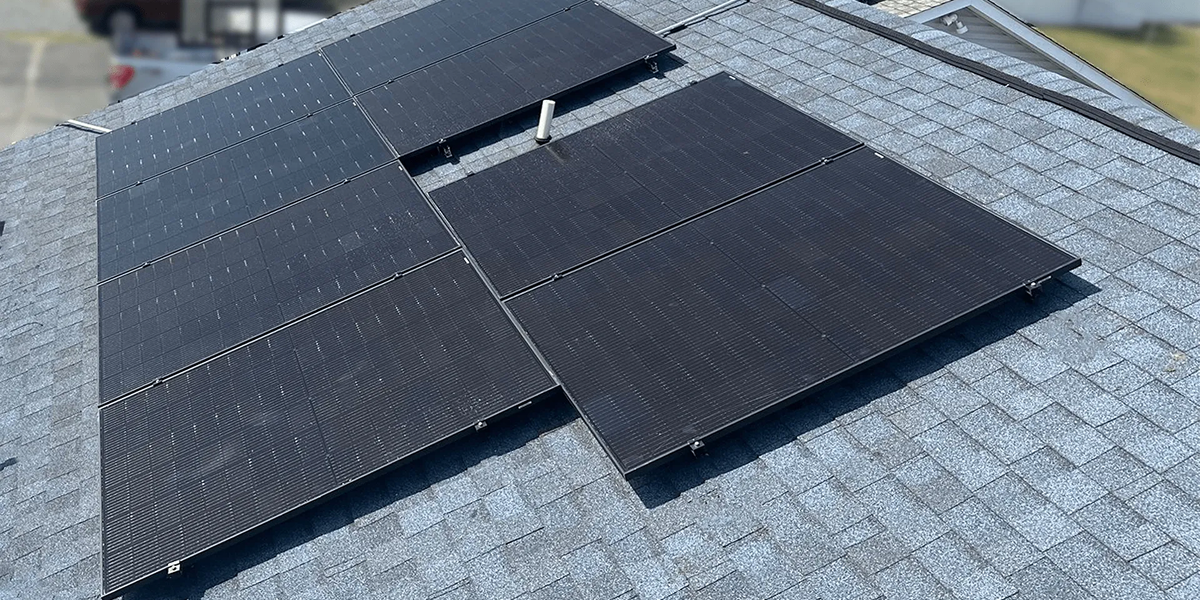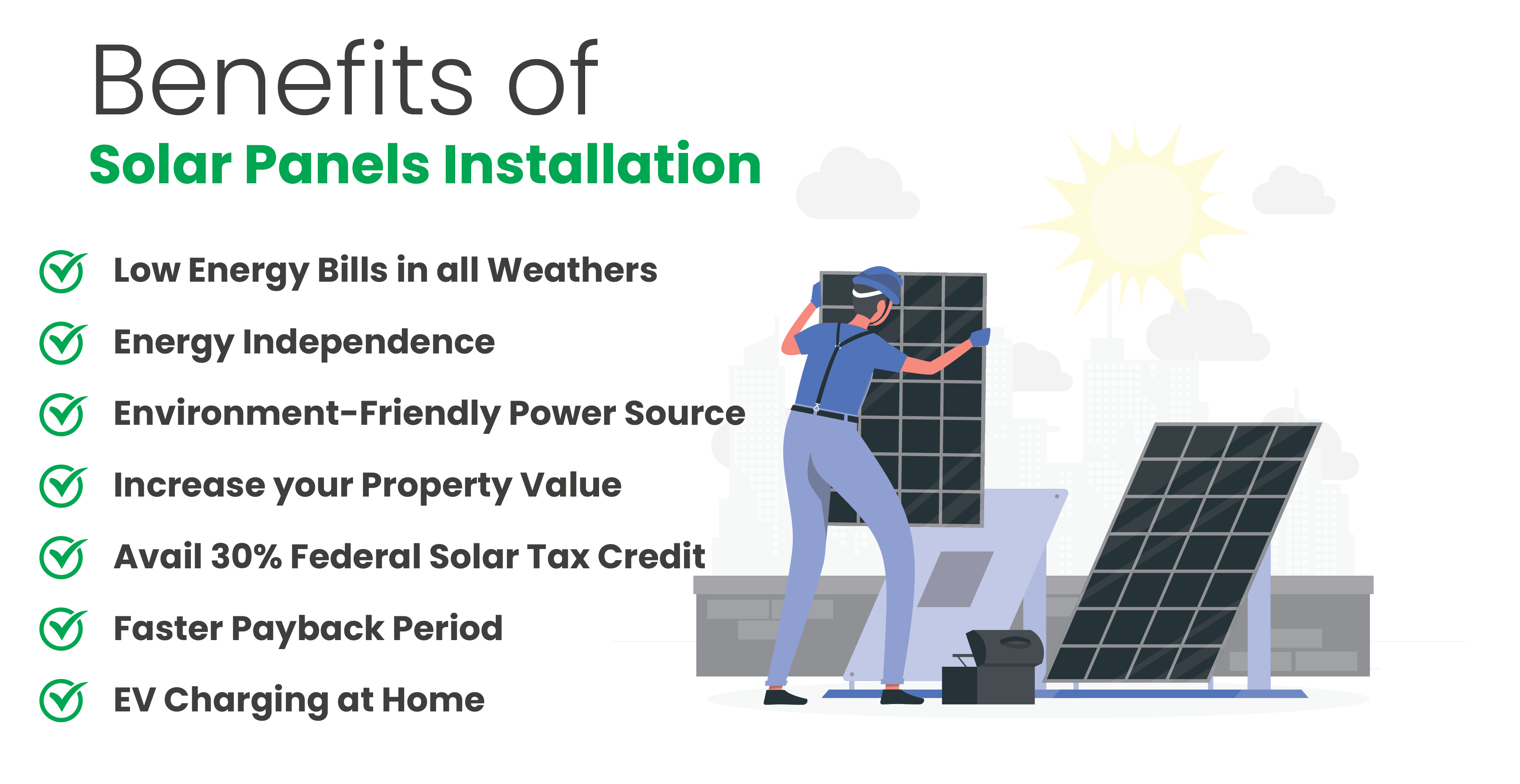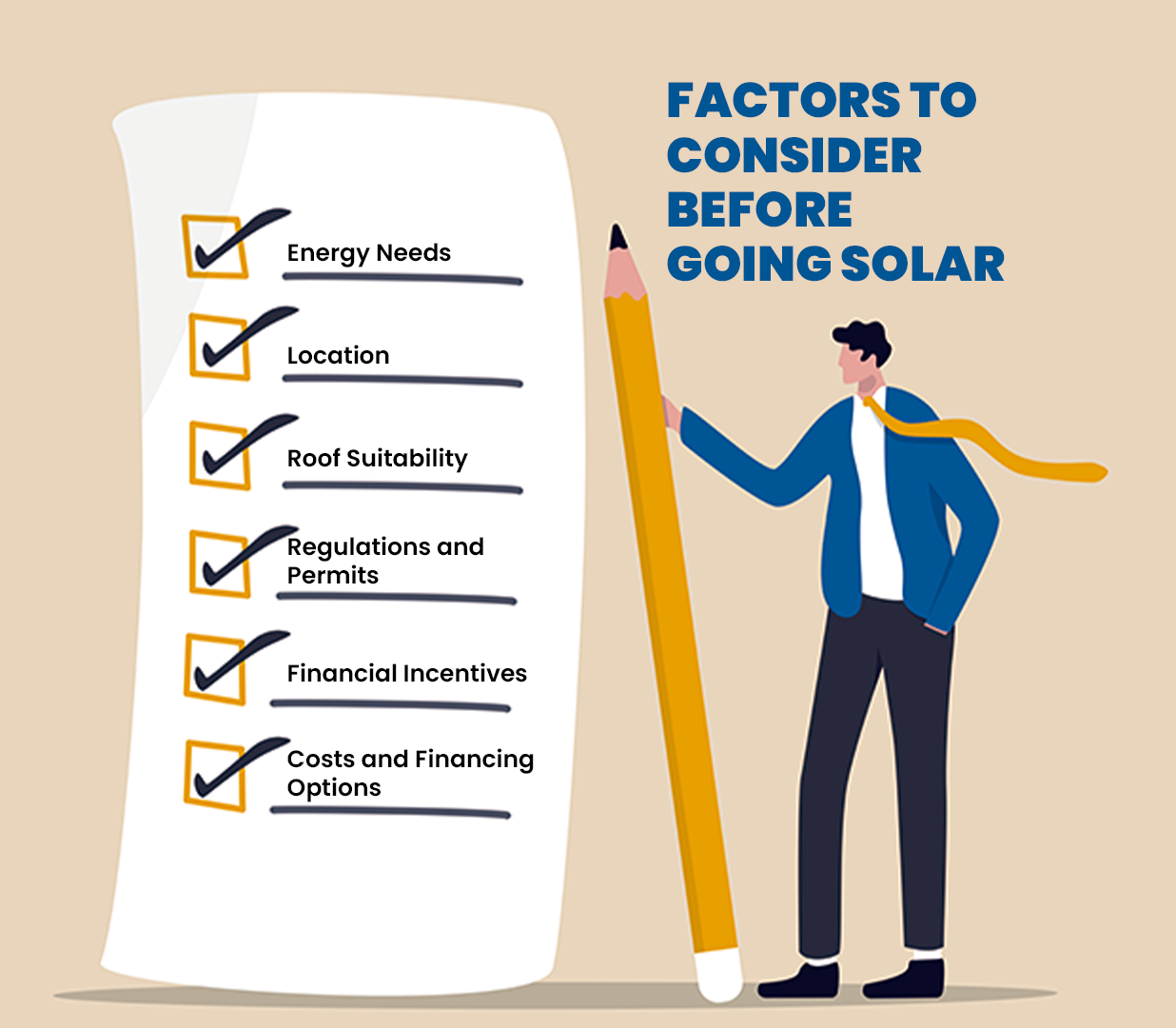- Updated On: April 5, 2025
Understanding the Benefits of Solar Panels: Should You Go Solar?
Are you tired of soaring energy bills and booming inflation? A solution is right above you – literally! Solar panels are an eco-friendly, cost-effective solution to control your energy costs. Switching to solar energy lowers your carbon emissions, offers energy bill savings, and increases your property value. In this article, we discuss the benefits of solar panels and why you should consider installing solar power.

What is solar power?
Solar power harnesses energy from the sun. In photovoltaic solar panels, the PV cells convert sunlight into electrical current. Solar power systems vary in scale, from small rooftop solar installations to vast solar farms, generating enough energy to power thousands of homes and businesses. The sun’s abundant, free energy makes solar power an important player in transitioning towards eco-friendly and sustainable energy solutions.
How do solar panels work?
Solar panels operate by absorbing solar energy when sunlight strikes them. Photoreactive materials in the PV cells are excited by the absorbed energy and produce an electrical current that we harness as usable electricity.
A solar inverter receives the direct current electricity produced by the solar panels and converts the DC electricity into alternating current (AC). The type of energy used in most homes and businesses to power devices, lighting, and appliances in the home.
What are the benefits of solar installations?
Low Energy Bills all year
Residential and commercial energy users can save a lot of money on their energy bills by switching to solar power and locking in monthly energy costs. That’s not the case with power from the electric grid. The Consumer Price Index shows that during the 12 months ending in June, electricity prices increased an average of 5.4% and that’s part of a larger trend.
Energy Independence
Another benefit of solar panels is that you use less electricity from the grid when you install residential solar panels. Sunlight-generated electricity is storable as well. With the addition of solar batteries, the excess power produced on sunny days can be used at night or on overcast days. Adding an energy storage system to your solar panel system can help your house become self-sufficient and even go off the grid. The decision about an off-grid or grid-tied system will rely on your energy needs, local regulations and how much you want to spend on a PV system. During a blackout or outage, a solar system with a battery storage system can even help you power your house when everyone elses’ power is out.
Environmentally Friendly Power Source
Solar power is environmentally friendly as it harnesses energy from the sun without emitting greenhouse gasses or pollutants. The process involves no air or water pollution, minimizing environmental impact. Solar energy contributes to a sustainable future by reducing the need for fossil fuels, helping to mitigate climate change.
Increase your Property Value
Your home’s overall value usually rises when you install solar panels. The Lawrence Berkeley National Laboratory of the US Department of Energy estimates that solar panels can increase the value of your home by about 4%compared to homes without solar and can hasten the sale of your property.
30% of Costs are Covered by the Federal Solar Tax Credit
When you file your federal income taxes, you can claim the 30% investment tax credit for the year you install a solar system and any subsequent year until you recoup the full 30% ITC. The solar investment tax credit was reinstated at 30% and extended until 2032 by Congress under the Inflation Reduction Act, which passed in 2022. The ITC covers the solar PV system and related systems, such as an energy storage system.
Faster Paybacks are Possible
You can sell extra energy produced by your solar array to your utility company through net metering or other arrangements. One of the benefits of net metering is that it shortens your solar payback period—the time it takes for you to recover your initial solar investment. Net metering is not available in every state, so be sure to verify with your utility provider and your local solar installer.
Solar EV Charging at Home
With a solar installation and an electric vehicle charging system at home, EV owners are less reliant on external energy sources, mitigating the impact of fluctuations in energy prices. The utilization of solar energy for charging EVs not only cuts down charging expenses amid inflation but also actively contributes to the promotion of sustainable living.

What are the cons of solar panel installation?
- High Initial Cost: The upfront solar investment in purchasing and installing solar panels is relatively high. Although prices have decreased significantly over the years, the initial investment remains a barrier for some homeowners.
- Intermittent Energy Production: Solar panels need sunlight to generate electricity, and their energy production is affected by weather conditions and time of day. They are less effective during cloudy days, at night, and during the winter when days are shorter. There are times when a system won’t produce as much or any energy.
- Space Requirements: Solar panels typically require significant space, especially for larger installations. Not all properties have enough roof space or suitable land to accommodate the necessary number of panels for optimal energy production.
- Maintenance Costs: While solar panels generally have low maintenance requirements, they are not entirely maintenance-free. Cleaning, monitoring, and occasional repairs are sometimes necessary, adding to the overall cost of ownership.
- Dependency on Government Incentives: Changes in government policies or the expiration of incentives can affect the financial attractiveness of solar installations.
Despite these minor drawbacks, it is important to note that advancements in solar technology, decreasing costs, and ongoing research are addressing many of these concerns, making solar energy an attractive, sustainable option for many homeowners and businesses to take control of their energy spending and carbon footprint.
What are the factors to consider before going solar?
Consider the following to determine whether solar panels are a worthy investment for your home.

- Evaluate your current and future energy needs. Consider the size of your home or business, your typical energy consumption patterns and whether you’re planning on needing more or less energy in the future.
- Solar panels are most effective in areas with abundant sunlight. Assess the amount of sunlight your location receives. Consider factors such as shading, roof orientation, and local climate. A south-facing roof with minimal shading is ideal, but solar panels are still effective on east or west-facing roofs.
- Examine the condition of your roof. Solar panels last for 25 or more years. Do you need to put a new roof on before going solar?
- Evaluate the overall cost of the solar installation, including equipment, installation, and maintenance. Explore financing options, such as loans or leasing, and assess the long-term financial implications.
- Check local regulations and permitting requirements for installing solar panels. Some areas may have restrictions or specific guidelines on solar installations.
- Research available financial incentives, rebates, and tax credits for installing solar panels. These will significantly reduce the overall cost and improve your return on investment.
By carefully considering these factors and consulting with a reliable, local solar installer who can answer all of these concerns for you, you can make an informed decision about whether solar energy is a great option for you.
Is it worth to go solar in 2025?
Yes. Almost always. First and foremost, going solar means saving on your electricity bills. Due to advancing technology, solar panels are more efficient and affordable than ever. Federal and state incentives and tax credits significantly slash the initial costs, making solar power a cost-effective investment for most households. Also, as solar technology is getting better and systems cheaper, charging your EV at home with solar power is becoming a more cost-effective choice.
2025 is the perfect time for Americans to consider solar power. It’s the bright choice. It brings savings, environmental benefits, increased home value, and ushers in a future powered by sustainable and efficient energy.
Are you looking for an affordable solar installation near you? Thousands of happy customers chose SolarSME for their solar installation and you can, too. You can also Request a free quote now!
Related Articles:
In the U.S., homeowners and businesses are rapidly transitioning toward clean power to reduce energy costs and achieve maximum grid resilience.
While considering major factors before switching to solar, like cost, financing etc, it is pivotal to analyze, "Is my roof good for solar? it is pivotal to analyze, "Is my roof good for solar? and guide you on all solar roofing factors!
Choosing a solar panel system for your home, you’ll typically encounter two main options: off-grid and on-grid (also known as grid-tied) solar systems.



